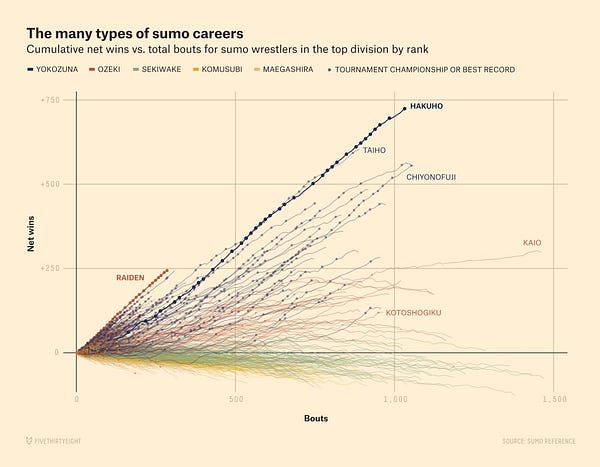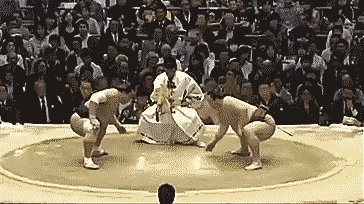By Walt Hickey
Welcome to the Numlock Sunday edition.
This week, a little something different! A few weeks ago, I wrote up a story about Hakuho, a sumo wrestler, who had announced his retirement. Here’s what I wrote.
Hakuho, the greatest-of-all-recorded-time of sumo wrestling, is retiring. Since reaching the title of yokozuna — the highest rank in sumo — Hakuho has won at least one of the top six tournaments every year since 2007, having now won a record 45 grand sumo tournament titles. In July, he won the Nagoya Grand Sumo Tournament with a perfect 15-0 record, and has won or finished second in 49 of 52 tournaments. Hakuho, who is originally from Mongolia, became a Japanese citizen in 2019 and is thus eligible to run his own stable should he so choose, but the current plan is to remain at his current stable and become an instructor.
When I saw this news break, I knew there was one person who I had to talk to about it, my former FiveThirtyEight colleague Benjamin Morris. Back in 2016, Ben wrote one of my favorite-ever stories, The Sumo Matchup Centuries In The Making, all about the sport and its history and this guy named Hakuho, who even then Ben argued was the greatest of all time.
I spoke to Ben all about the greatest’s retirement, the changing face of sumo, and what made Hakuho so dang good. It’s a great read even if you don’t know anything about the sport. Ben can be found on Twitter at @skepticalsports.
This interview has been condensed and edited.
So, Ben, you wrote a really great story a couple of years back all about the history of sumo wrestling, and specifically this one wrestler in particular named Hakuho. Can you tell me a little bit about how you were able to get data for this? Data goes back a long ways for sumo, right?
Yeah, I mean, 250 years, it goes back pretty far you could say. There’s a website, Sumo Reference, he had all of the basic stuff going back a while, and he's added more and more stuff to it over time. He basically lent me his database for that story. I used that and was able to put together some pretty cool things about history. It was pretty fun. The data set, it's strange, because it could actually be way better than it is. Because prior to the 1900s, you only have tournament results, what everyone's final records are, but apparently you can go see in person, they have the match-by-match results in these giant books at the Sumo Hall of Fame in Japan.
Oh my God.
But they won't let anyone take pictures of them, because they could take pictures and then transcribe it, like a match by match, this guy asked, he was willing to go to Japan and do it for them, and they turned him down. So that data exists. I'd love to have it. But maybe someday.


Maybe someday! And so the crux of your story was all about this wrestler who was active at the time, you were making an argument as to why he was potentially the greatest of all time. That's a fairly declarative statement when you have 250 years of history. Can you tell me a little bit about Hakuho?
He had 37 championships at the time, I think, and he has 45 now. He's extremely dominant in the sport. He's had both a very dominant career, in that he has the highest win percentage in modern sumo, as well as one of the longest careers in modern sumo. I think he has something like the eighth-most matches of anyone, and with the highest winning percentage. As a result, he is in first place by a lot. He has 45 tournament wins, there's six tournaments a year, they're kind of like majors in tennis or golf. So it's roughly the same as winning 30 majors in tennis or golf.
The really dominant wrestlers seem to win a lot, but they're less common. Like there's usually someone pretty dominant in tennis who wins a bunch of tournaments, whereas the dominant sumo wrestlers, there have only been like four or five in the last 100 years, although all of them have won an enormous amount, or whatever. So Hakuho mostly is distinguished from, say Taiho, who is very similar to him, because Hakuho's career is much longer.


So what makes him so good?
Oh man, it's a really interesting question. I mean, there are multiple ways of answering. One, from a strictly sumo perspective, what makes him so good is that he's as good as the skilled little guys in sumo who have to work miracles to win all their matches. And he is also big and strong and powerful and he is built like a bear, like the biggest, strongest guys in sumo. So when you watch him, it's almost categorically different from watching other sumo wrestlers.
On the second level after that one, he's really taken the sport in new directions. He's much more aggressive than a lot of sumo wrestlers are. He slaps a lot. He'll use his elbows. As I wrote about in that article, he's used some questionable strategic things. Like there's this move called the Henka, which is sidestepping your opponent's initial charge, is frowned upon, but legal in sumo, and he's used that in the past. So he's really pushed the sport a bit, in directions that I'm not sure the sport's really willing to go. But as you'd expect from top competitors these days, they're going to push the boundaries.
And then I'd say the third thing that makes him so good, is it's a really interesting time period for him to be this good. Sumo has grown a lot as a sport and it's gone international. He's from Mongolia, himself, and I think what you can see is that sumo has gone from being a niche sport to being a bit of a more mature sport. Another evidence of that, for example, Hakuho's father was an Olympic silver medalist in freestyle wrestling, despite being a Mongolian wrestler who didn't regularly do freestyle wrestling.
So he's like a world-class athlete in a way that sumo is much more of a regional sport, right? Now it's competing on this world level. Hakuho is a world-class athlete competing in a smaller sport. In the future, if sumo continues developing, you might see more of that. I mean, it's already dominated by these foreign guys. But in his case you see it especially, because he's so athletic too, that sometimes he's just athletically on a different level from the other sumo wrestlers.
You sent me a video about his most recent match. He's a guy who's towards the end of his career, but he went 15 and 0, he's just a phenomenal athlete. You just really see it.
I sent you that video in part because it was just fascinating. He's won eight of his last 10 tournaments that he's completed, but he's had to withdraw or skip 15 of the last 25 tournaments. Over that same time period he's skipped a lot. So the end of his career has just been fascinating, because his body's been breaking down, and he is injured half the time or more, but when he is still wrestling, he still wins, almost all the time. So he's still the best sumo wrestler right now, despite the fact that he's retiring.
It's not exactly like going out on top, like Michael Jordan or something, because it's not. He's only won one and a half basho per year over the last five years, whereas he used to win three to four every year. But the main reason for that is he's missed so many basho. That video I sent to you, the July 2021 all bouts video. What's interesting about that is that he's not doing his normal sumo one in that, right? The normal method of the top sumo wrestler is you charge, you knock the guy back. You grab his mawashi, or his belts, and then you either throw him to the ground or toss him out of the ring using that leverage of grabbing onto his belts.
And in this tournament, he only gets someone's belt clean one time, and he only gets their belt at all, like four times in the entire tournament. And he still goes 15 and 0, which is, by the way, a rare thing to happen in its own. It doesn't happen very often. He does it almost entirely through his general athleticism and just his escapability and his ability to improvise in these situations. There's some really strange strategic choices he made in the second to last match, where he was injured, he reinjured himself during this tournament and kept going.
And during his second to last match, he started all the way in the very back so that he didn't have to hit the other guy with a hard charge. And he would try to win by slapping and that sort of thing, which was very controversial, by the way. It was a lot of things they got mad at him for, because they thought that was unbecoming of a yokozuna to employ that strategy of trying to win without hurting himself. And it was extremely successful.
In many ways, that match-up was just — I could see one of the reasons he retired — it was just so emblematic of his career, the way it's gone of being dominant and innovative, all in one. He's still an incredible wrestler now, going out while he is still very good before his body is completely wrecked.
To that point, one thing that I really enjoyed about your story is that sumo wrestlers, from a completely novice perspective, look as if it's all about physicality. But there's a ton of intelligence and a ton of planning that goes into it that is really fascinating once you know what to look for.
Even since I wrote that story, when I already had watched a million Hakuho matches, I learned a bit more about sumo, just following it. Mostly I watched the summaries of the tournaments when they happen. One thing about sumo, it's a very easy sport to follow, because there's six tournaments a year. All the bouts in the top division from every day can be found in a 15 minute clip online, and then they're 15 days. So your overall time commitment to follow it as a sport is quite low, unlike most sports.


So I still followed it, and I've learned a bit more about sumo since then. The more you learn, the more you learn how difficult it is what they're doing. I knew that he was more of a grappler type than like a pushing, thrusting type when I wrote that story, how he's big enough to be a pusher, thruster, but skilled enough to be a grappler. But since then, I've learned that's not a perfect breakdown, and it's actually more impressive than that, that he really has the skills that a very small person in wrestling needs.
He has people who he has been a mentor to. He mentors two of the smallest sumo wrestlers, possibly of all time. But the two smallest currently in the upper division are wrestlers that he's mentored who are quite good, but they're incredible for their size. And he has the same kind of skillset that they have, which is this incredible escapability. I mean, he exploits his size when he can, he's also quite big, obviously, but the more I've learned about what those techniques are for little guys versus big guys and what kind of strategies he should be going for in theory, and just the kinds of things he does that other people don't do, the more you learn how just cutting edge he is as a wrestler as well.
So he's hanging it up. Sometimes these guys start a school, some of them just continue doing the mentorship. Reflecting on his career, he's still the greatest of all time, you think? Where does it go from here?
I think he's the greatest of all time, it's pretty unquestionable. I mean, he's just — he has so many wins. The second most, Taiho, has 32. And Hakuho has 45 basho. On top of that, he has, what, 16 undefeated tournaments. There are only six who even had 16 tournaments at all. And he has 16 undefeated ones. The next most is, Taiho had eight. The next most of anyone who's currently wrestling is someone with, I believe one, maybe two.
He's very similar to this other guy, Taiho, in terms of his career trajectory, except that it kept going for years and years and years, whereas Taiho stopped a little bit earlier. So he's the greatest sumo wrestler. I mean, one thing people ask sometimes is well, is he going to be the greatest forever? And I don't know! I mean, like I said, he's extremely dominant for where sumo is now and where it has been in the past. But if it actually grows into a bigger sport and becomes even more of a world-level sport than a regional-level sport as it has been historically, you could see whole new levels of competition in that. So who knows how that will go.
As for what's next for him, I guess he's trying to be a stable master, but that's been a little controversial too. The yokozuna council is mad at him over such things as being extremely happy when he won his tournament. And he pumped his fist in victory and he roared a little bit, he was very happy.
Scandalous.
I mean, literally, it's like a scandal. It's disrespectful to his opponent that he roared at him that he'd beaten him, despite it being really kind of a miracle that it happened. I mean, you think you probably knew that he was thinking about hanging it up pretty soon too, right? It was his last tournament so it was very emotional and that sort of thing. So they're mad at him. I haven't followed in the last couple weeks, so I could be out of date, but last I saw, they were considering suspending him from being able to own his own house for a year or something like that, and then reevaluate it. I don't know if they made a final decision on that or not.
But, yeah, he's a Japanese citizen now. He wants to run his own stable. He's been successful at mentoring people in the past, so he could be very effective at that as well. And as usual, he has taken a lot of crap for being extremely competitive, which has been a thing throughout his career.
Where can folks find you now?
On Twitter, @skepticalsports.
If you have anything you’d like to see in this Sunday special, shoot me an email. Comment below! Thanks for reading, and thanks so much for supporting Numlock.
Thank you so much for becoming a paid subscriber!
Send links to me on Twitter at @WaltHickey or email me with numbers, tips, or feedback at walt@numlock.news.



This was so cool to read. Thank you!
Fascinating story!